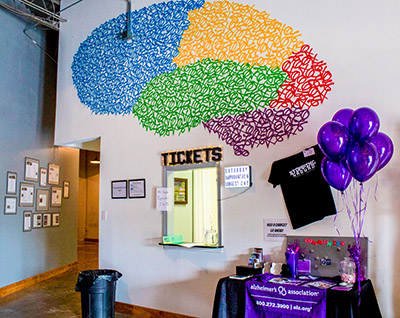There are a few rules to improv. The first: “Yes, and…” In other words, be accepting of ideas.
To make a scene work, improvisors have to agree with the story they’re building together — the who, what, and where. “Yes, and…” is a rule of thumb for improv that encourages actors to accept what another has said and expand upon it by adding new information.

The storefront off Stomping Ground Comedy Theater’s location of Manufacturing Street in Dallas. [Photo: Yvena Chowdhury]
For caregiver Tim Painter, the technique, which he learned in one of Dallas-based Stomping Ground Comedy Theater’s Improv For Life classes, has also been helpful in caring for his parents, who have Parkinson’s and Alzheimer’s diseases. He’s also passed on the tip to his clients at Alcove Senior Advocates, a senior living referral service.
“When my stepmother started showing signs of cognitive decline and not remembering things or misremembering things, my dad wanted to be helpful by correcting her, which would frustrate her,” he said.
Instead of correcting a family member or patient, “Yes, and…” is used to redirect the conversation in a non-confrontational or abrupt way by agreeing with them and adding more information.
“Generally, not telling people the truth is not a good thing. In this case, not rocking the boat is a higher good.”
Tim Painter
For example, Painter explains, if one states: “I used to work in the circus and trained elephants.”
While you know that’s untrue, you might respond: “Yes, and tell me more about working with elephants. Did you like it?”
Painter coached his father to use this technique with his stepmother.
“When my stepmother would say, for example, ‘This Sunday we’ll go over and visit mom and dad at their house.’ Well, her parents passed away 30 years ago, and at one point, he would have said, ‘Honey, we can’t go visit them they passed away,’ and it was a horrible experience because in her mind she didn’t know that, and it threw her into a grieving process,” Painter said.
“Generally, not telling people the truth is not a good thing. In this case, not rocking the boat is a higher good.”
CREATING THERAPEUTIC PROGRAMMING
The Improv For Life program, which started offering classes a year ago, is lead by licensed psychotherapist and improviser Andrea Baum.

A recent Improv For Life session at Stomping Ground Comedy Theater in Dallas. [Photo: Yvena Chowdhury]
“When the quality of life of the caregiver is good, so is the quality of life of the person they’re caring for. That’s what research shows us,” Baum said.
The Improv for Caregivers class is one of several different classes offered by Stomping Ground for people in the community who have unique needs. There also are classes for people with autism, Alzheimer’s and dementia, anxiety, and brain injuries.
Baum, who worked in private practice and had always had a passion for improv, took classes in the evening after seeing patients during the day. She noticed through her classes that the life skills she was teaching her clients were naturally embedded in improv and started exploring national research on the benefits of improv on mental health.
When Baum heard of Lindsay Goldapp’s plans for the first nonprofit comedy theater in Dallas, she joined Stomping Ground’s board of directors and worked with Goldapp, who is Stomping Ground’s managing director, and the team to make Improv For Life part of the theater’s programming.
In addition to Improv For Life, Stomping Ground offers professional shows and classes for adults in improv training, sketch comedy, stand-up comedy, and improvised song, as well as programs geared toward kids and teenagers.
SECURING A SPOT
Stomping Ground is led by its board of directors and a staff of 15, including a diversity director, women’s advocate, and music director. The team has training experience from theaters across the country such as, The Second City Chicago and The Groundlings in Los Angeles.
Performances are regularly held at the theater on Manufacturing Street in the Design District, which had its grand opening on June 1. Prior to having a brick and mortar building, Stomping Ground hosted classes and shows at various venues throughout Dallas.
“It connects people, which a lot of time with mental health issues there can be a lot of isolation and disconnect.”
Andrea Baum
As a nonprofit without an owner, shareholder, or bottom line, Stomping Ground receives funding from entertainment revenue, individual donations, and grants applied to its therapeutic programs.
A campaign on Kickstarter helped Stomping Ground secure the funding needed for a building equipped with a stage, sound system, and lighting. The campaign raised more than $33,000 when it ended on Dec. 27, which was more than the initial goal of $30,000. On Jan. 1, the team had a lease.
“We are now working towards getting funding and grants so the Improv For Life programs can be practically free and accessible to everyone,” Baum said.
“With mental health in general, there’s a big stigma to get help and pay for it, and just for it to be known that you’re actually getting mental health help, too, so this is a way that it can be accessible, and it’s also fun and interactive and social. It connects people, which a lot of time with mental health issues there can be a lot of isolation and disconnect.”
SECOND RULE: THIS IS YOUR SPACE.
Baum and the team at Stomping Ground open up a class by making sure participants know that they are free to express themselves.

A mural at Stomping Ground Comedy Theater’s Design District location gives homage to the brain. [Photo: Yvena Chowdhury]
At the core of Stomping Ground’s mission is its commitment to diversity and inclusion. It offers internships, a diversity and outreach scholarship, and a financial scholarship each term. Its casts of students and performers come from diverse backgrounds, too.
“One of the reasons why improv can be so therapeutic is because it’s a no-judgement zone, and we very much put that into place at the beginning,” Baum said.
“When we say we’re going to be accepting of everyone’s ideas here, that makes you feel supported. When you feel supported, you feel more safe. We try to make a supportive environment, and then, what happens in turn when you learn that no one is judging you, you stop judging yourself.”
ONE LAST RULE: FOCUS ON THE HERE AND NOW.
Improv works best when the actors have their minds set on the scene they’re unfolding on stage. That same practice of focusing on the present is effective in calming the mind and connecting with those around you. Baum focuses the Improv for Anxiety course around this principle of mindfulness.
“Improv really teaches us to treat one another with respect and how to communicate in positive ways.”
Andrea Baum
“If someone’s taking a regular improv class, too, they’re role playing everything that’s in their subconscious, and they’re getting to express themselves in all sorts of different ways,” she said. “Improv increases emotional intelligence and someone’s ability to express themselves and be aware of their emotions.”
As Stomping Ground makes itself a home in the Design District, Baum and the team hope that the theater can now reach more of the community and spread the benefits of a bow-worthy laugh.
“We’re in a time right now where how we’re communicating and treating one another is so important,” Baum said. “Improv really teaches us to treat one another with respect and how to communicate in positive ways.”

Stomping Ground Comedy Theater staff [Photo: Angela Ross]
![]()






























